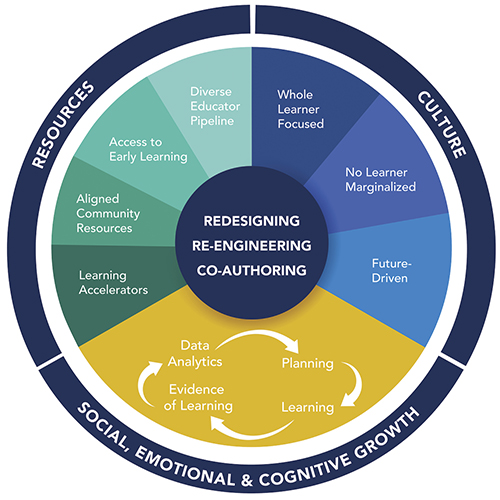Learning 2025 Takeaways Spur a District’s Own Initiatives
March 01, 2022

It was April 2021 during a Georgia superintendents’ conference when Gwinnett County and state education leaders heard Bill Daggett challenge our thinking by asking if we were preparing all students for “their future.” Then he introduced
us to the work of Learning 2025 and shared the research provided by the AASA’s Learning 2025: National Commission on Student-Centered, Equity-Focused Education. The research and vision sounded exciting and like the right work in which to engage.
Coincidentally, our school district of 180,000 students completed several cross-functional action teams, and the recommendations were aligned to the commission’s report. We were implementing components such as focusing on the whole learner
through social, emotional and cognitive growth, learning accelerators, aligning community resources, extending access to early learning and increasing our diverse educator pipeline.
Our school district has a culture of being future-driven
with multiple learning options for students to be college- and career-ready. That said, we were engaging in the work but were not in the network yet.
A Close Alignment
- Why did we join the network?
In September 2021, when superintendent Calvin J. Watts and I met with the Learning 2025 leadership team, we noticed a clear connection between Learning 2025’s major focus areas on student-centered, equity-focused and future-driven education and leading with empathy, equity and excellence.
In addition, another valuable aspect of the Learning 2025 network is the access it provides to research-based resources and opportunities to collaborate with other school districts. These benefits were the driving factors in Gwinnett County Public Schools’ decision to join the network as a demonstration district. - How do the resources and collaboration contribute to our work?
Right now, the process is the plan. We are socializing the Learning 2025 Network Wheel components with our internal and external stakeholders. Our goal is to plant seeds around the district and gather feedback, which will help us to formally introduce and implement the work.
One example surfaced during Leadership Development I, a monthly meeting with senior district leaders and school principals. Beginning last October, we started to unpack the national commission’s report. Our leaders read one component each month, and then we provide time and space for reflection. We ask questions such as what are your hopes and fears regarding the work? In what areas are we doing well? What areas do we need to improve? What barriers get in the way? What do we need to reinvent or redesign?
In addition to that, we are visiting schools and gathering feedback from teachers and students regarding their current school experiences to inform our plan moving forward. We must hear, understand and learn from the people who will implement the work. This is one of many key takeaways from the Learning 2025 demonstration districts.

Critical Feedback
Another part of the process and benefit of the network is the development of our Learning 2025 communication plan. In preparation for the rollout of our districtwide communication plan in January, we collaborated with other superintendents during the
superintendent roundtable. This is a special forum through the network to enable superintendents to work together.
During this time, we shared our initial communication plan, and leaders from other school districts provided us with critical
feedback, reminding us of the need to empathize with our staff and to think about the implications and perceptions. Then we shared our final communication plan with our senior consultant, Jack Smith, a recently retired superintendent. He reminded
us to remember and honor our strong history as we move the district forward and remain focused on our students and the Gwinnett community.
Being a Learning 2025 demonstration district is both an honor and a huge responsibility. Together, with the other 120-plus demonstration school districts, we will strengthen our educational system to prepare young people for their futures
so they can make our world better.
Advertisement
Advertisement
Advertisement
Advertisement



